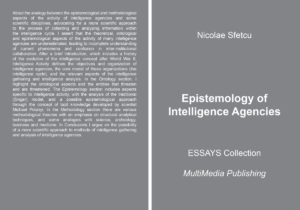A process of intelligence gathering begins when a user enters a query into the system. Several objects can match the result of a query with different degrees of relevance. Most systems estimate a numeric value about how well each object matches the query and classifies objects according to this value. Many researches have focused on practices of intelligence gathering. In knowledge engineering, knowledge gathering consists in fiding it from structured and unstructured sources in a way that must represent knowledge in a way that facilitates inference.
DOI: 10.13140/RG.2.2.32191.15527
Category: Intelligence
Intelligence cycle
The intelligence cycle is a set of processes used to provide useful information for decision-making. The cycle consists of several processes. The related counter-intelligence area is tasked with preventing information efforts from others. A basic model of the process of collecting and analyzing information is called the “intelligence cycle”. This model can be applied, and, like all the basic models, it does not reflect the fullness of real-world operations. Through intelligence cycle activities, information is collected and assembled, raw information is transformed into processed information, analyzed and made available to users.
DOI: 10.13140/RG.2.2.25665.81760
The Intelligence Community
Intelligence services are currently focusing on the fight against terrorism, leaving relatively little resources to monitor other security threats. For this reason, they often ignore external information activities that do not pose immediate threats to their government’s interests. Extremely few external services operate globally. Almost all other services focus on immediate neighbors or regions. These services usually depend on relationships with these global services for information on areas beyond their immediate neighborhoods, and often sell their regional expertise for what they need globally. A feature of both internal and external services is that they behave like a caste.
DOI: 10.13140/RG.2.2.25847.68006
Epistemology of Intelligence Agencies
 About the analogy between the epistemological and methodological aspects of the activity of intelligence agencies and some scientific disciplines, advocating for a more scientific approach to the process of collecting and analyzing information within the intelligence cycle. I assert that the theoretical, ontological and epistemological aspects of the activity of many intelligence agencies are underestimated, leading to incomplete understanding of current phenomena and confusion in inter-institutional collaboration. After a brief Introduction, which includes a history of the evolution of the intelligence concept after World War II, Intelligence Activity defines the objectives and organization of intelligence agencies, the core model of these organizations (the intelligence cycle), and the relevant aspects of the intelligence gathering and intelligence analysis. In the Ontology section, I highlight the ontological aspects and the entities that threaten and are threatened. The Epistemology section includes aspects specific to intelligence activity, with the analysis of the traditional (Singer) model, and a possible epistemological approach through the concept of tacit knowledge developed by scientist Michael Polanyi. In the Methodology section there are various methodological theories with an emphasis on structural analytical techniques, and some analogies with science, archeology, business and medicine. In Conclusions I argue on the possibility of a more scientific approach to methods of intelligence gathering and analysis of intelligence agencies.
About the analogy between the epistemological and methodological aspects of the activity of intelligence agencies and some scientific disciplines, advocating for a more scientific approach to the process of collecting and analyzing information within the intelligence cycle. I assert that the theoretical, ontological and epistemological aspects of the activity of many intelligence agencies are underestimated, leading to incomplete understanding of current phenomena and confusion in inter-institutional collaboration. After a brief Introduction, which includes a history of the evolution of the intelligence concept after World War II, Intelligence Activity defines the objectives and organization of intelligence agencies, the core model of these organizations (the intelligence cycle), and the relevant aspects of the intelligence gathering and intelligence analysis. In the Ontology section, I highlight the ontological aspects and the entities that threaten and are threatened. The Epistemology section includes aspects specific to intelligence activity, with the analysis of the traditional (Singer) model, and a possible epistemological approach through the concept of tacit knowledge developed by scientist Michael Polanyi. In the Methodology section there are various methodological theories with an emphasis on structural analytical techniques, and some analogies with science, archeology, business and medicine. In Conclusions I argue on the possibility of a more scientific approach to methods of intelligence gathering and analysis of intelligence agencies.
CONTENTS:
Abstract
1 Introduction
1.1. History
2. Intelligence activity
2.1. Organizations
2.2. Intelligence cycle
2.3 Intelligence gathering
2.4. Intelligence analysis
2.5. Counterintelligence
2.6. Epistemic communities
3. Ontology
4. Epistemology
4.1. The tacit knowledge (Polanyi)
5. Methodologies
6. Analogies with other disciplines
6.1. Science
6.2. Archeology
6.3. Business
6.4. Medicine
7. Conclusions
Bibliography
DOI: 10.13140/RG.2.2.12971.49445
07.04.2019
MultiMedia Publishing https://www.telework.ro/en/e-books/epistemology-of-intelligence-agencies/
An Epistemic Evolution of Intelligence
 The perception of intelligence as power has intensified during the Second World War, when several intelligence agencies has been formalized and significantly increased. In all countries, new agencies and departments have been set up to deal with threats. Government publications in developed countries, following the September 11, 2001 attack, reflected a consensus that intelligence services are key to preventing mass attacks, spending huge amounts for the intelligence agencies that are considered a major component of national security systems.
The perception of intelligence as power has intensified during the Second World War, when several intelligence agencies has been formalized and significantly increased. In all countries, new agencies and departments have been set up to deal with threats. Government publications in developed countries, following the September 11, 2001 attack, reflected a consensus that intelligence services are key to preventing mass attacks, spending huge amounts for the intelligence agencies that are considered a major component of national security systems.
DOI: 10.13140/RG.2.2.16398.20809